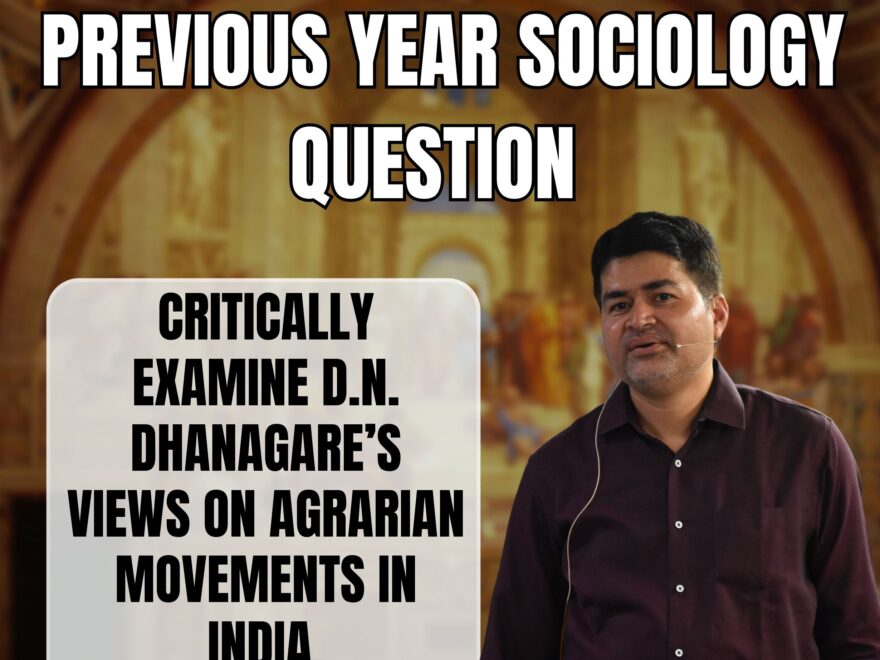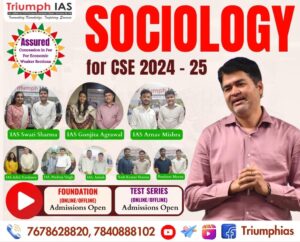Critically examine DN Dhanagares views on agrarian movements in India
Section: B.
Sociology Paper 2011.
Relevant for Sociology Optional for Civil Services Examination.
Paper 2: Unit-13 Social Changes in India; Social movement in Modern India
Question: Critically examine DN Dhanagares views on agrarian movements in India
– 20 Marks
Introduction: Brief Introduction About D.N. Dhanagare.Main Body: D.N. Dhanagare Viewpoint on Agrarian Movements.Conclusion: Significance Towards Indian Sociological Studies of Agrarian Movement. |
Introduction:
- D.N. Dhanagare was an eminent Indian sociologist and scholar known for his extensive work on agrarian movements in India. His views on agrarian movements provide valuable insights into the dynamics of rural protest and social change.
Main Body:
D.N. Dhanagare viewpoint on agrarian movements, Limitations of D.N. Dhanagare viewpoint
- Historical Context: He emphasized that these movements evolved over time in response to changing socio-economic and political conditions.
- Comparative Analysis: Dhanagare’s drawS a comparative analysis between the Shetkari Sangathan and the populist People’s Party of the USA in the 1890s contextualizing and understanding agrarian movements within a broader historical and global framework.
- Class Character of Agrarian Movements: Dhanagare emphasized the class character of agrarian movements. He argued that these movements were primarily driven by class-based conflicts between landlords and peasants, with the latter seeking to assert their rights and improve their economic conditions.
- Peasant Mobilization: Dhanagare highlighted the role of leadership and mobilization in agrarian movements. He believed that charismatic leaders played a crucial role in galvanizing peasants and organizing collective action. Dhanagare emphasizes the unique leadership characteristics within the Shetkari Sangathan and other agrarian movements. The fact that farmer leaders were not just mobilizers
- Modes of Protest: Dhanagare categorized agrarian movements into various modes of protest, such as petitions, demonstrations, and armed struggles. He argued that the choice of protest methods depended on the balance of power between landlords and peasants.
- Impact of Liberalization: He brought out the dimensions of the rift between different farmers’ movements in response to liberalization and GATT reforms and underscores the challenges faced by agrarian movements when dealing with changing economic and political contexts
- Ideological Inspirations: He mentioned Sharad Joshi’s references to thinkers like Rosa Luxemburg and Mahatma Gandhi to indicate that the intellectual underpinnings of the movement were diverse, drawing from both Western and Indian thought. This suggests a broad ideological spectrum within the movement
- State Response: Dhanagare examined the role of the state in agrarian movements, particularly in terms of its repressive actions and attempts to co-opt or reform agrarian structures. He argued that the state’s response often depended on its perception of the threat posed by the movement.
Limitations of N. Dhanagare viewpoint:
- One criticism of Dhanagare’s work is that it tends to focus predominantly on North India and may not fully capture the regional variations in agrarian movements across India.
- Moreover, some scholars have argued that his framework leans towards a deterministic view of agrarian movements, where class conflicts are seen as the sole driving force.
- It is criticised for overemphasis on role of leadership tends to underplay the significance the agency of mass peasants.
Conclusion:
D.N. Dhanagare’s views on agrarian movements in India provide a valuable framework for understanding the class dynamics, leadership, and historical context of these movements.. His ability to capture the complexities of agrarian movements and their socio-political implications is recognized as a valuable contribution to the discipline.
Related Blogs …
| |
To master these intricacies and fare well in the Sociology Optional Syllabus, aspiring sociologists might benefit from guidance by the Best Sociology Optional Teacher and participation in the Best Sociology Optional Coaching. These avenues provide comprehensive assistance, ensuring a solid understanding of sociology’s diverse methodologies and techniques.
META TAGS:
Heritage Tourism, heritage tourism in india, heritage tourism upsc, Urban Development, Socio-Spatial Patterns, Cultural Exchange, Gentrification, Conservation, Regional Development, Cultural Identity, Over-urbanization, Inclusive Development, development of heritage tourism in india, India
Why Vikash Ranjan’s Classes for Sociology?
Proper guidance and assistance are required to learn the skill of interlinking current happenings with the conventional topics. VIKASH RANJAN SIR at TRIUMPH IAS guides students according to the Recent Trends of UPSC, making him the Best Sociology Teacher for Sociology Optional UPSC.
At Triumph IAS, the Best Sociology Optional Coaching platform, we not only provide the best study material and applied classes for Sociology for IAS but also conduct regular assignments and class tests to assess candidates’ writing skills and understanding of the subject.
Choose The Best Sociology Optional Teacher for IAS Preparation?
At the beginning of the journey for Civil Services Examination preparation, many students face a pivotal decision – selecting their optional subject. Questions such as “which optional subject is the best?” and “which optional subject is the most scoring?” frequently come to mind. Choosing the right optional subject, like choosing the best sociology optional teacher, is a subjective yet vital step that requires a thoughtful decision based on facts. A misstep in this crucial decision can indeed prove disastrous.
Ever since the exam pattern was revamped in 2013, the UPSC has eliminated the need for a second optional subject. Now, candidates have to choose only one optional subject for the UPSC Mains, which has two papers of 250 marks each. One of the compelling choices for many has been the sociology optional. However, it’s strongly advised to decide on your optional subject for mains well ahead of time to get sufficient time to complete the syllabus. After all, most students score similarly in General Studies Papers; it’s the score in the optional subject & essay that contributes significantly to the final selection.
“A sound strategy does not rely solely on the popular
Opinion of toppers or famous YouTubers cum teachers.”
It requires understanding one’s ability, interest, and the relevance of the subject, not just for the exam but also for life in general. Hence, when selecting the best sociology teacher, one must consider the usefulness of sociology optional coaching in General Studies, Essay, and Personality Test.
The choice of the optional subject should be based on objective criteria, such as the nature, scope, and size of the syllabus, uniformity and stability in the question pattern, relevance of the syllabic content in daily life in society, and the availability of study material and guidance. For example, choosing the best sociology optional coaching can ensure access to top-quality study materials and experienced teachers. Always remember, the approach of the UPSC optional subject differs from your academic studies of subjects. Therefore, before settling for sociology optional, you need to analyze the syllabus, previous years’ pattern, subject requirements (be it ideal, visionary, numerical, conceptual theoretical), and your comfort level with the subject.
This decision marks a critical point in your UPSC – CSE journey, potentially determining your success in a career in IAS/Civil Services. Therefore, it’s crucial to choose wisely, whether it’s the optional subject or the best sociology optional teacher. Always base your decision on accurate facts, and never let your emotional biases guide your choices. After all, the search for the best sociology optional coaching is about finding the perfect fit for your unique academic needs and aspirations.
Follow us:
🔎 https://www.instagram.com/triumphias
🔎https://www.youtube.com/c/TriumphIAS
🔎https://t.me/VikashRanjanSociology
Find More Blogs
| Compare and contrast Karl Marx’s and Max weber’s | Karl Marx- Historical Materialism |
| Talcott Parsons : Social system | Scope of the subject and comparison with other social sciences |
keyword: DN Dhanagares views on agrarian movements, DN Dhanagares views on agrarian movements, DN Dhanagares views on agrarian movements, DN Dhanagares views on agrarian movements, DN Dhanagares views on agrarian movements, DN Dhanagares views on agrarian movements, DN Dhanagares views on agrarian movements, DN Dhanagares views on agrarian movements, DN Dhanagares views on agrarian movements, DN Dhanagares views on agrarian movements


